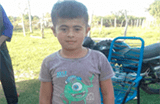
Felipe*, 10 years old, lives in Abai, Paraguay with his parents. When missionaries named Susana and Alejandro visited his grandmother’s home, he learned about the opportunity to go to a nutrition centre, run by Jesus Responde, Global Aid Network’s partner in Paraguay. At the nutrition centre, children from impoverished backgrounds can come weekly, receive nutritious meals, receive tutoring and learn about Jesus.
Before going to the nutrition centre, Felipe disobeyed his parents and showed very little interest in his studies. Despite already being in third grade, he didn’t know how to read or write.
Felipe is now in fourth grade. His mother commented that she has been congratulated by Felipe’s teacher because his behaviour has notably improved. Not only that, but he can now read Bible verses correctly, thanks to the care and attention he has received from the nutrition centre. This has impacted Felipe’s entire family and has opened the door for his parents and grandfather to all receive Christ in their hearts.
Soon, they are expected to take the next step of being baptized.
Susana, the missionary, commented that their church has grown and that they are extending the services they offer at the nutrition centre to provide more meals. Through children like Felipe, we can see how the simple service of providing food can allow encounters with their families and the opportunity to share the love of Christ with them.
*Name has been changed
YOU COULD PROVIDE A NUTRITIOUS MEAL AND MORE FOR A CHILD LIKE FELIPE. WOULD YOU GIVE A GIFT THAT CAN MAKE A LIFE-CHANGING IMPACT ON A CHILD?
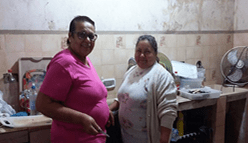
Mrs. Clotilde Haedo (pictured on the right), 57 years old, is a hardworking mother of seven, currently living with two of her kids in Isla Bogado, Paraguay, in the neighborhood of Luque. She has faithfully attended the National Marathon of Prayer, an event organized annually by Global Aid Network (GAiN)’s Paraguayan partner Jesús Responde, since 2010.
In August 2012, a young volunteer from Jesús Responde met with Clotilde and shared stories of impact from the Jesús Responde wholistic community centres and invited Clotilde to partner with them as a donor. She accepted the invitation and committed to giving 20,000 Guaranies ($4.36 CAD).
True to her word, Clotilde gave the agreed amount each month.
Unfortunately, as time passed, her family experienced a financial crisis, causing her to, with great sorrow in her heart, renounce the commitment that she had made.
In September 2017, the pastor, of Clotilde’s church, Pastor Cleibel Peixoto, challenged the members of his congregation to start a wholistic community centre. Although she was hesitant at first, Clotilde agreed to be one of the cooks. In that moment, she remembered the commitment she had made and could not fulfill years ago. Clotilde saw this as a new opportunity that came from God. He was calling her once again to serve.
By the end of 2017, the wholistic community centres had served the community successfully and the number of children in attendance increased. Upon hearing this, a representative of Jesús Responde en Luque told them of the support given to the churches that work with children.
On February 13, 2018, Pastor Cleibel presented his application and shortly thereafter began to work in partnership with the institution.
On June 3 of that same year, Mrs. Clotilde confirmed during a volunteer day, once again, the call for her life. “I thank God for showing me, after thirty years (in the way of the Lord), the ministry that He had kept for me,” she told us, with tears in her eyes.
Today she serves with joy and faithfulness at the community centre, loving and caring for the children. The children have praised her, saying that they do not even eat a meal made with as much affection in their homes.
YOU CAN HELP BRING WHOLISTIC NUTRITION TO IMPOVERISHED CHILDREN IN PARAGUAY. WILL YOU HELP SUPPORT A WHOLISTIC COMMUNITY CENTRE?
GIVE TODAY
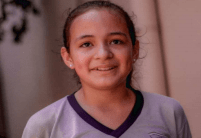
Telma is 12 years old and lives with her mother Liz, her grandmother Esperanza and her sister Sara. For the majority of her life she has been under the care of her grandmother because her mother was absent. When her mother wasn’t working she would spend her free time with friends, attending parties or other participating in other activities outside of the house.
Grandmother Esperanza already knew about Jesus and was a regular church attendee. Her church runs a wholistic community centre with Global Aid Network (GAiN)’s Paraguayan partner Jesus Responde. At these community centres, children from impoverished backgrounds are invited to attend weekly, where they receive a nutritious meal, play games with other kids, and learn about Jesus through the AWANA program.
Telma was two years old when her grandmother brought her and her sister Sara to a wholistic community centre. It was there that she was taught about Jesus and his love. Every morning, Telma and Sara would pray to God that Liz (their mother) would come to know Jesus.
Eventually, after years of praying, their mother decided to accompany Telma and Sara to church. It was in one of the meetings that she got to know Jesus. Now, the whole family attends church together. Recently, Grandmother Esperanza lost her eyesight but continues to attend church meetings, thanks to perseverance and the help of Telma who is an active church participant.
Telma shares, “Jesus transformed my family. In my house there is more peace and more joy. Sara and I now receive the attention and affection from our mother that we did not have when we were younger. We are grateful because every day we are taken care of, loved and get to learn about God.”
WOULD YOU LIKE TO SUPPORT A WHOLISTIC COMMUNITY CENTRE IN PARAGUAY?
GIVE TODAY
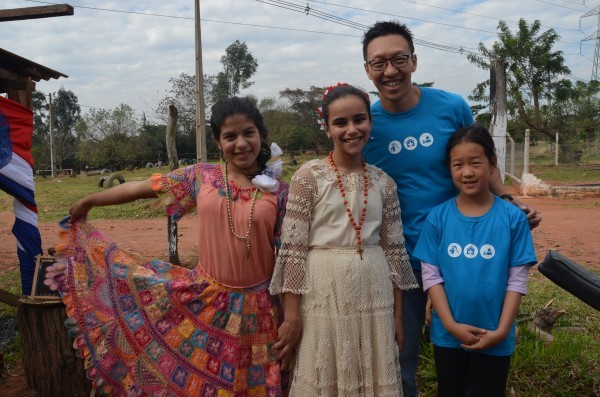
“I never knew that I could make an impact in other people’s lives with the things that God has taught me and prepared me for,” Osmond, from Richmond, B.C., stated after his return from a GAiN LIFE Team trip to Paraguay in July 2017. “I knew in what areas we were going to serve but I didn’t know how God was going to use us, to be perfectly honest. We were just answering the call to go and we were just trusting that God would reveal Himself to us in new and exciting ways – and He really did. He changed my entire perspective on the concept of global missions.”
Typically, mission trips are perceived to have carved out specific roles for volunteers: the doctor, nurse or physician, helping aid and provide care for those without access to proper healthcare; the teacher, carefully loving on the village children and imparting their knowledge; the builder helping build schools, houses or churches. Among those roles, Osmond could not see where he fit in.
“I’m not a healthcare professional. I’m not a teacher. I’m not a structural engineer, I don’t build houses,” said Osmond, whose specific discipline in engineering is in control systems. “I wasn’t really sure how God was going to use me in this particular capacity other than an extra pair of hands. Through this trip, God made me realize that there is a lot of need in the world for the professional skills that I’ve learned over the years and that I’m able to bless a lot of people through that.”

Despite his preconceptions about mission roles and his skill-set, Osmond was able to make a difference in the lives of a group of women in Paraguay. It was his 20-year business experience that was of value to the women at Diaconia, GAiN’s Paraguayan partner.
The majority of impoverished women in Asunción, Paraguay are stuck in a cycle of poverty that traces back to the Paraguayan War in the 1800s, in which the country was defeated, along with the majority of its male population. The devastating consequences of this war still impact Paraguay today.
Osmond learned that post-war, the country’s top priority was re-population, creating a culture where men were encouraged to have multiple partners. This practice stuck around for centuries and has had ill effects on Paraguay’s family structures. It is culturally acceptable for men in this region to not be involved in the family, leaving women as single parents, struggling to get by in an already desperate economy.
That’s where Diaconia, GAiN’s Paraguayan partner, comes in. Diaconia provides micro-loans to women, encouraging them to take vocational classes and start their own businesses. With financial literacy training and other business classes, women in the program have access to education that empowers them to pay off their debts and help them get out of poverty.
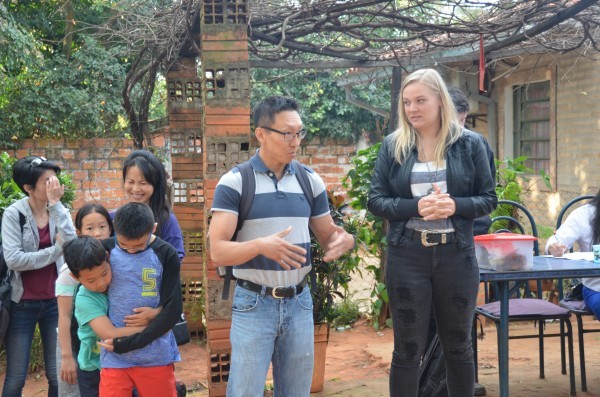
As a business professional, Osmond’s expertise allowed him to do a presentation for Diaconia loan recipients, sharing his knowledge on small business and entrepreneurial best practices and principles. The presentations were restructured to address the unique challenges these women face.
“I would have never guessed that [my business knowledge] would be useful at all, but yet God did a completed 180 on me. I never realized how needed it was because many of these ladies never had the opportunity to learn anything about basic business practices before.”
They finished the workshop with a talk on sustainability and creating a long-term business – something that is a foreign concept to the locals in Asunción, whose immediate concern is day-to-day survival.
“I had a lot of people come up afterward, thanking me for everything that we shared with them,” Osmond recalled. ”We talked [and] we prayed with the women. They seemed so encouraged by that. Seeing that light and that spark in the ladies that were there… Many of them indicated they were excited to be able to go back [to work] and start implementing things they learned from the seminar. They wanted to take advantage of these new ideas presented, that they could see tangible uses for. It was so exciting.”
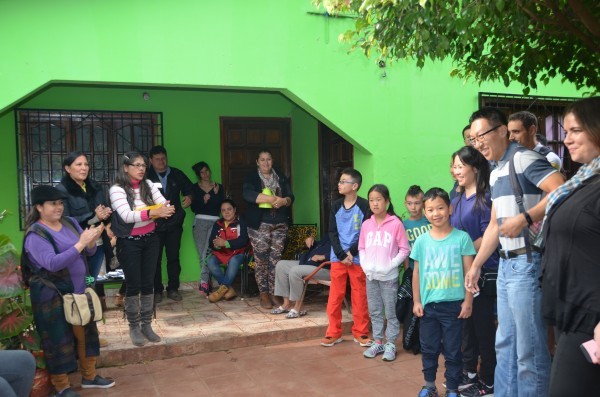
There was story after story of women whose lives had changed because of the program. One, in particular, stood out.
Amalia had a lifelong dream of owning an empanada shop. The shop was initially run from a small tent outside of her home. With the help of the loan, she was able to build a permanent building structure, complete with electricity and plumbing. Customers are welcomed with an awning and the store is furnished with stools.
“She opened the store early [one day] so that we could sample her empanadas. We were glad to purchase them, they were amazing!” Osmond raved.
“[These women] started with nothing and there was no way to break the cycle of poverty without this type of an opportunity. To have a business idea and be able to do something that removes them from the need to scavenge day by day for their basic necessities – it was so inspiring.”
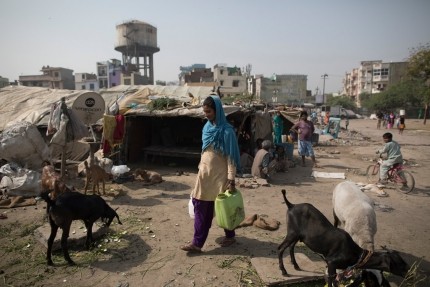
12 July 2017 – Some three in ten people around the world lack access to safe and readily available water at home, and almost six in ten to safely managed sanitation, a new United Nations report has warned, calling on countries to do more to fulfil these basic human needs.
According to the World Health Organization (WHO) and the UN Children’s Fund (UNICEF) joint report, Progress on Drinking Water, Sanitation and Hygiene: 2017 Update and Sustainable Development Goal Baselines, many homes, healthcare facilities and schools also lack soap and water for handwashing, putting the health of all people – but especially young children – at risk for deadly diseases.
“Safe water, sanitation and hygiene at home should not be a privilege of only those who are rich or live in urban centres,” Tedros Adhanom Ghebreyesus, the WHO Director-General, said in a news release, announcing the findings and noting that those living in rural areas are the worst affected.
As a result of lack of these basic services, millions fall ill to diseases – that could, otherwise, have been easily prevented – such as diarrhoea which claims the lives of 361,000 children under the age of five die, every year, noted the UN agencies.
“Safe water, effective sanitation and hygiene are critical to the health of every child and every community – and thus are essential to building stronger, healthier, and more equitable societies,” underscored Anthony Lake, the Executive Director of UNICEF.
‘Significant’ inequalities persist
Good hygiene is one of the simplest and most effective ways to prevent the spread of diseases such as diarrhoea, cholera, dysentery, hepatitis A, and typhoid.
However, findings in the report revealed that access to water and soap for handwashing varies immensely in the 70 countries with available data, from 15 per cent of the population in sub-Saharan Africa to 76 per cent in western Asia and northern Africa.
These significant inequalities also put the implementation of the Sustainable Development Goals (SDGs), in particular Goal 6 on ensuring availability and sustainable management of water and sanitation for all at risk.
Backed by the data, the two UN agencies also warned that in as many as 90 countries around the world, progress towards basic sanitation is too slow, “meaning they will not reach universal coverage by 2030”.
In addition, hundreds of millions without even ‘basic’ drinking water
According to the report, of the 2.1 billion people who do not have safely managed water, 844 million do not have even a basic drinking water service.
This includes 263 million people who have to spend over 30 minutes per trip collecting water from sources outside the home, and 159 million who still drink untreated water from surface water sources, such as streams or lakes.
Furthermore, of the 4.5 billion people who do not have safely managed sanitation, 2.3 billion still do not have basic sanitation services, including nearly 600 million people who share a toilet or latrine with other households, and 892 million people – mostly in rural areas – who defecate in the open.
Improvements these services, are therefore essential not only for realizing the 2030 Agenda for Sustainable Development and giving the most vulnerable a chance at a better future.
“As we improve these services in the most disadvantaged communities and for the most disadvantaged children today, we give them a fairer chance at a better tomorrow,” said Mr. Lake.
In the same vein, Mr. Ghebreyesus underscored: “These are some of the most basic requirements for human health, and all countries have a responsibility to ensure that everyone can access them.”
